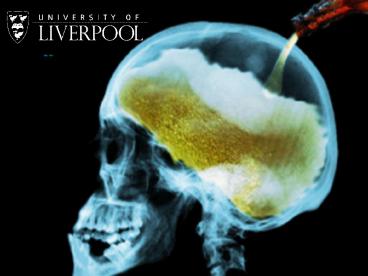Dr Matt Field - PowerPoint PPT Presentation
1 / 35
Title:
Dr Matt Field
Description:
... people more likely to drink, or does alcohol make people act more impulsively? ... But people also behave more impulsively' when intoxicated ... – PowerPoint PPT presentation
Number of Views:64
Avg rating:3.0/5.0
Title: Dr Matt Field
1
(No Transcript)
2
Boozy brains? Alcohol use in adolescents
Dr Matt Field School of Psychology University of
Liverpool
3
Rising rates of alcohol consumption in adolescents
Source Institute of Alcohol Studies, 2007
4
Those that drink, are drinking more
Source NHS, 2007 11-15 year olds
5
Immediate consequences
Source NHS, 2006 11-15 year olds
6
Today
- Thinking processes (cognitions) that are
associated with alcohol use in adults and young
people - Implicit cognition
- Impulsivity
- Cognitions as cause or consequence, or both?
- Experimental research cognitions that change as
a consequence of alcohol use - Cognitions that can cause alcohol use
- Why is this particularly relevant to heavy
drinking in youth?
7
Source Addiction, 2007, vol 102, p579-586.
8
Implicit cognition substance-related stimuli
grab the attention in addiction
Source Ingmar Franken, Erasmus University
Rotterdam, The Netherlands
9
The modified Stroop task
- sofa
- table
- bed
- chair
- cupboard
- desk
10
The modified Stroop task
- beer
- vodka
- gin
- lager
- cider
- whisky
11
Adolescent heavy drinkers find the alcohol words
more difficult
Source Addiction, 2007, vol 102, p579-586.
12
Is this attentional bias a cause or a
consequence of heavy drinking?
- Classical conditioning?
13
Pavlovs dogs
Source www.howstuffworks.com
14
Conditioning in humans
15
Can humans be conditioned to alcohol?
CS Contains alcohol (taste
disguised) FOUR PAIRINGS
CS- Contains placebo (taste disguised) FOUR
PAIRINGS
Source Psychopharmacology (2002), vol 159,
p335-324
16
Measurement of eye movements
Source Psychopharmacology (2002), vol 159,
p335-324
17
An alcohol paired cue can grab the attention
after only four pairings
Source Psychopharmacology (2002), vol 159,
p335-324
18
This was after only four pairings after
extensive experience with alcohol, your reaction
to alcohol cues may be more like this
19
- Can attentional bias influence how much we drink?
20
Using the dot probe task to increase
attentional bias
.
Press a button AS SOON AS YOU SEE THE DOT!
21
Using the dot probe task to reduce attentional
bias
.
Press a button AS SOON AS YOU SEE THE DOT!
22
attentional bias can influence beer consumption
Source Psychopharmacology (2005), vol. 183,
p350-357.
23
Summary attentional bias (a component of
implicit cognition)
- gt Can be caused by classical conditioning
(experience of pairings between alcohol and
environmental stimuli) - gt Can be a cause of alcohol consumption (and also
self-reported alcohol craving)
24
Impulsivity
- We can define impulsivity in many ways
- The desire for immediate gratification, even if
this carries longer-term costs (CLICK) - Difficulty withholding inappropriate responses
(earlier talk) - Taking inappropriate risks
- All aspects of impulsivity are ASSOCIATED with
heavy drinking in adults and older adolescents - Causality again are impulsive people more likely
to drink, or does alcohol make people act more
impulsively?
25
(No Transcript)
26
(No Transcript)
27
28
So impulsive people are more likely to develop
alcohol problems?
- Yes, probably.
- But people also behave more impulsively when
intoxicated - There is some evidence that long-term heavy
drinking might produce long-lasting increases in
impulsivity
29
IMPULSIVITY
HEAVY DRINKING
30
Why is this relevant to alcohol use during
adolescence?
- Attentional bias and impulsivity are thought to
be related to the function of the prefrontal
cortex.
31
Maturation of the brain, ages 5-20
Prefrontal cortex
Source Proceedings of the National Academy of
Sciences of the USA (2004), vol. 101, p8174
32
Alcohol-induced prefrontal cortex damage is
greater during adolescence
Source Alcoholism Clinical and Experimental
Research, 2000 (vol 24, p1712) and 2005 (vol 29,
p207)
33
(No Transcript)
34
WHAT DOES IT ALL MEAN?
IMPULSIVITY
HEAVY DRINKING DURING ADOLESCENCE
LONG-TERM CHANGES IN BRAIN FUNCTION
INCREASED IMPULSIVITY AND ALTERED IMPLICIT
COGNITION
35
Acknowledgements
- People Paul Christiansen, Jon Cole, Brian
Eastwood, Gordon Fernie, Andrew Goudie
(University of Liverpool) Theodora Duka
(University of Sussex) - Research funding










![READ[PDF] The English: A Field Guide PowerPoint PPT Presentation](https://s3.amazonaws.com/images.powershow.com/10058303.th0.jpg?_=20240619031)




















